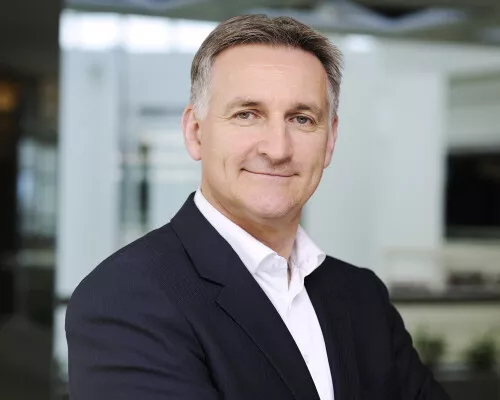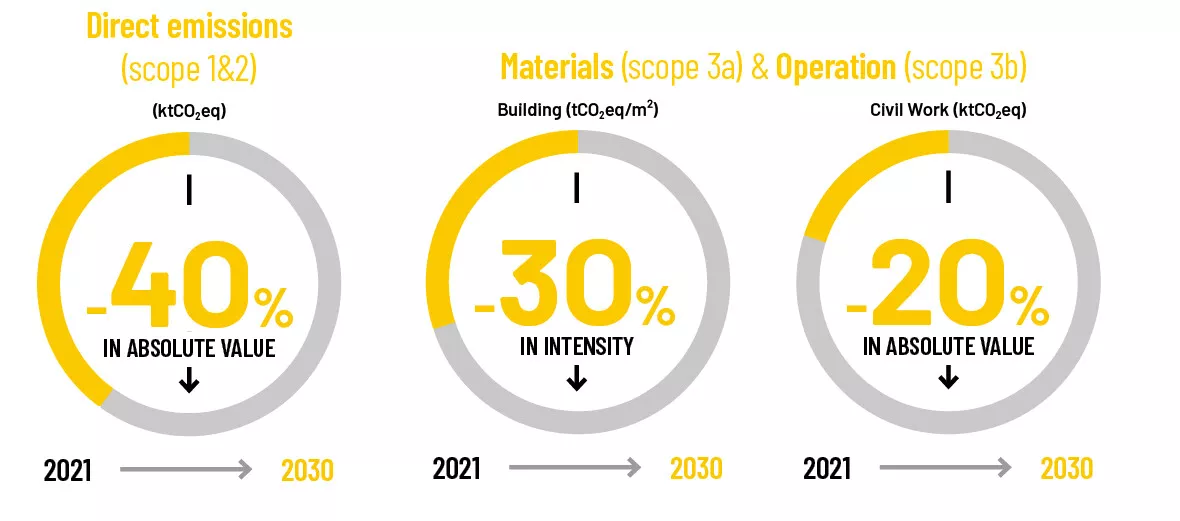Press release
The Science Based Targets initiative (SBTi) approves Bouygues Construction's carbon emission reduction targets.
04-01-2024
The Science Based Targets initiative (SBTi) has officially validated Bouygues Construction’s greenhouse gas emission reduction targets for the period 2021-2030. This certifies that the company’s commitments are consistent with current scientific climate data and comply with the Paris Agreement, which is intended to keep the increase in global average temperature well below 2°C compared to pre-industrial levels, while continuing efforts to limit it to 1.5°C.
Bouygues Construction has set itself the goal of achieving three targets for reducing greenhouse gas emissions by 2030 compared to 2021:
- A 40% reduction on scopes 1 & 2 [1] (direct emissions produced by the company’s own activity).
- A 30% reduction on scope 3 (indirect emissions generated by the company’s value chain) in intensity [2] upstream (construction phase) and downstream (operational phase) for buildings [3].
- A 20% reduction on scope 3 upstream civil works [4] in absolute value [5].
This commitment will be implemented on the basis of the following eight major levers of action:
Scopes 1 and 2
- Use of biofuels for site machines
- Site machines and vehicle fleets powered by electricity / hydrogen
- Purchase of green energy for consumption by the company
Scope 3
- Use of low-carbon concrete, recycled steel and bio-sourced materials (wood, straw, raw earth, etc.)
- Application of an eco-design approach aimed at reducing emissions during phases of construction and operation
- Utilisation of components generated by the circular economy
- Selection of suppliers with the lowest emissions factors in their categories
- A greater proportion of rehabilitation projects
To manage the programme, Bouygues Construction has put in place a carbon management cycle that combines optimising and monitoring the carbon footprint during each phase of every project, from design to handover, as well as scheduling and activating drivers of decarbonisation which are monitored by means of company-wide progress indicators. Examples include:
- For scopes 1 & 2: the percentage of biofuels used for site machines, the proportion of electric and hybrid vehicles ordered, and the portion of our consumption supplied as renewable energy
- For scope 3: the carbon intensity of concrete utilised on construction sites, the percentage of recycled reinforcing steel employed, and the percentage of projects incorporating a significant amount of construction timber
Pascal Minault, Chairman and Chief Executive of Bouygues Construction, said: “The construction industry has historically been a significant source of CO2 emissions, but today it is in possession of solutions that will contribute strongly to reducing them: by implementing solutions to decarbonise the construction process, designing energy efficient buildings, carrying out the energy renovation of the existing building stock and constructing infrastructures for the low-carbon society, particularly for energy production and low-carbon mobility.”
Bouygues Construction is enriching its know-how and developing innovative and virtuous technical solutions for the benefit of all its projects and its customers. All the drivers of decarbonisation – including timber construction, bio-sourced materials, recycling and reuse of materials and eco-design – are activated for the construction of “Archisober” buildings.
SBTi certification recognises Bouygues Construction’s commitment to reducing its CO2 emissions in compliance with the Paris Agreement and to involving all its partners in this urgent and critical initiative. It is consistent with positions that the Bouygues group and its Chairman, Martin Bouygues, have taken in favour of sustainable development for some twenty years.
Marie-Christine Korniloff, director of corporate engagement at WWF France, was delighted with this certification by SBTi, which was jointly founded by WWF. “At WWF, we are proud to work closely with companies like Bouygues Construction, providing valuable support to help in the transformation of their activities,” she said. “We can offer partners of WWF practical methodologies adapted to and founded on scientific data, thereby contributing to the formulation of credible commitments for reducing their carbon footprints thanks to the Science Based Targets initiative, which we jointly founded.”
[1] Scopes 1&2 (direct emissions produced by the company’s own activity): electricity on construction sites, fuel for site machines, energy consumption of head offices and local offices, business travel, vehicle fleets)
[2] Physical intensity: tonnes of CO2 emitted per m²
[3] Scope 3A (upstream) – construction phase: purchase of products and construction materials, freight, fixed assets, waste generated, IT equipment
[4] Scope 3B (downstream) – operational phase: emissions of products and services sold
[5] Absolute value: tonnes of CO2
Contact presse
Lire aussi...

Press release
Bouygues Construction introduces an integration programme for elite sportspeople
02-04-2024
En savoir plus
Press release
Appointment of Bertrand Burtschell as Chief Executive Officer of Bouygues Travaux Publics
11-05-2023
En savoir plus


